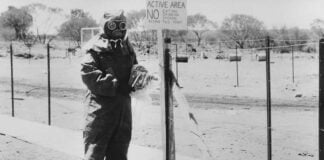ONE HUNDRED years ago the United States was the biggest oil producer in the world. California alone accounted for 22 per cent of global output.
The development of the US oil industry is the subject of Paul Thomas Anderson’s new film, There Will Be Blood. The film tells the story of a man who strikes it rich on the oilfields of California in the early 20th century.
Daniel Plainview (played by Daniel Day-Lewis) is an intelligent and ambitious man who wants to build an oil empire. He begins the film as a silver miner but his discovery of large oil deposits in California makes him powerful enough to challenge the monopolistic power of firms like Standard Oil.
Anderson’s examination of the frontier is compelling and disturbing. He uses stationary and slow-moving long shots to create a sense of open spaces and great loneliness.
The frontier is depicted as a brutal and barren land whose only prize-oil-cost much human life. Horrible deaths and injuries at drill sites were common because of poor and unsafe working conditions.
One of the victims is Plainview’s adopted son, who loses his hearing in an accident caused by a blow-out (a large eruption of oil from underground). But Daniel leaves his injured son to attend to the fire created by the blow-out.
This marks the beginning of Daniel’s long moral deterioration, a theme which dominates the remainder of the film.
When he arrives in the small and impoverished community of Little Boston, Plainview adopts a humble posture and promises the town’s deeply religious inhabitants that the oil wealth will be shared by all.
But his initial humility is soon replaced by a swaggering contempt for the townsfolk’s fundamentalist religious beliefs. Daniel has no interest in prophets; only profits.
Despite its great premise and marvellous cinematography, I found this film somewhat disappointing. At two and a half hours, it’s very long, and also very slow-moving-there isn’t a word spoken for the first 14 minutes.
Viewing the previews, I hoped this film would offer an insight into how the hunt for oil has shaped the United States, and perhaps even shed light on how America’s obsession with oil led to the war in Iraq.
But the film is more of a parable about how a person can lose their soul in the quest for wealth. “I have a competition in me,” Daniel tells another character. “I want no one else to succeed. I hate most people.”
Even though Daniel seems disgusted with what he has become, he cannot stop. Anderson’s message is bleak: men like Plainview will continue to pursue great wealth no matter the cost to themselves or other people.
Anderson has produced a convincing, albeit drawn-out and veiled, moral critique of capitalism, an examination of how the pursuit of wealth can physically and mentally deform human beings. But the film’s focus on one individual comes at the expense of providing greater political and historical context.
There Will Be Blood is loosely based on Upton Sinclair’s novel Oil!, first published in 1927. I haven’t read the book but from what I’ve heard it’s a much more interesting look at the politics of the early American oil industry. It has been republished to coincide with the film’s release.
There Will Be Blood
Directed by Paul Thomas Anderson
In cinemas now
by Jarvis Ryan





